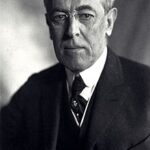President Woodrow Wilson’s support for the Nineteenth Amendment marked a pivotal transformation in American democratic history. Initially hesitant about women’s suffrage, Wilson evolved his position under mounting pressure from suffragists and changing public opinion. His endorsement proved crucial for constitutional passage. 📊
Wilson’s Political Evolution on Women’s Rights
Wilson initially favored state-by-state approaches to women’s voting rather than federal constitutional action. Persistent lobbying by suffragists like Alice Paul’s National Woman’s Party changed his perspective. Silent Sentinels protested outside the White House, calling Wilson “Kaiser Wilson” for denying democratic rights. These demonstrations, combined with women’s World War I contributions, shifted Wilson’s stance dramatically.
The Nineteenth Amendment Strategy
In January 1918, Wilson declared his support for the federal suffrage amendment as a war measure. He argued that denying women voting rights contradicted America’s democratic war aims. ⚠️ Wilson personally lobbied reluctant senators, emphasizing national unity and democratic principles. His presidential influence proved essential in securing the necessary two-thirds congressional majority for constitutional amendments.
Impact:
Wilson’s Nineteenth Amendment support fundamentally transformed American political participation and democratic representation. The constitutional amendment’s ratification in August 1920 immediately doubled the eligible voting population across the United States. 🌍
Immediate Democratic Expansion
The Nineteenth Amendment enfranchised approximately 26 million American women nationwide. This expansion represented the largest single increase in democratic participation in U.S. history. Women’s political engagement reshaped campaign strategies, policy priorities, and electoral outcomes. Politicians suddenly needed to address issues like child welfare, education funding, and social reform more seriously.
Long-term Constitutional Legacy
Wilson’s suffrage support established crucial precedents for federal civil rights interventions over state resistance. The amendment demonstrated how presidential leadership could advance constitutional equality against entrenched opposition. 📊 His decision influenced subsequent civil rights movements, including the struggle for African American voting rights. The Nineteenth Amendment became a foundation for later gender equality advances in American law and society.
International Democratic Leadership
Wilson’s women’s suffrage endorsement enhanced America’s international democratic credibility during World War I. The decision aligned with his Fourteen Points vision of global democratic expansion and self-determination principles. 🔥 This constitutional progress strengthened Wilson’s moral authority in promoting democracy worldwide through the League of Nations proposal.
